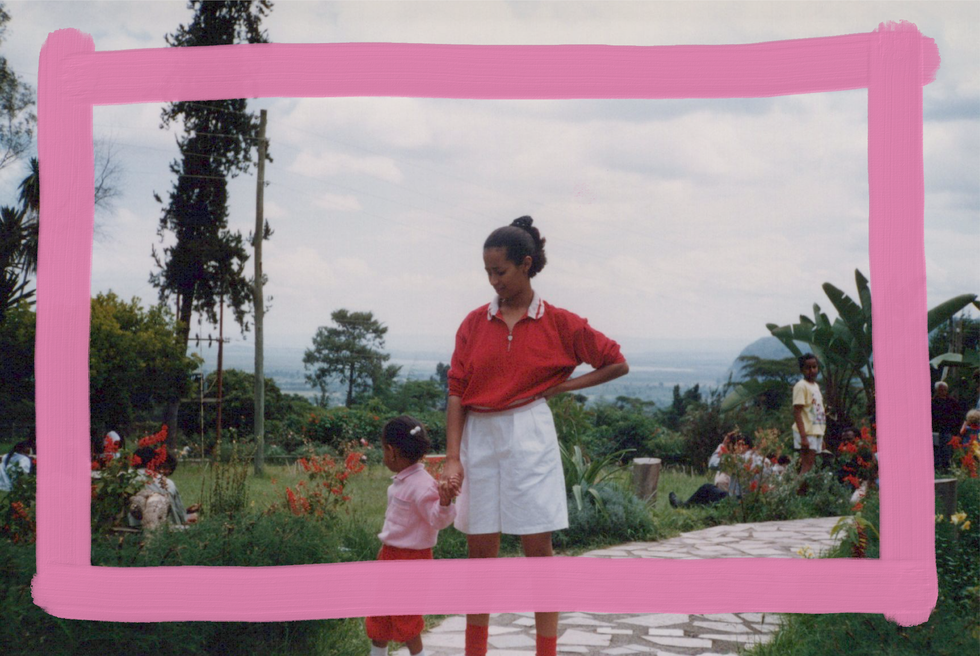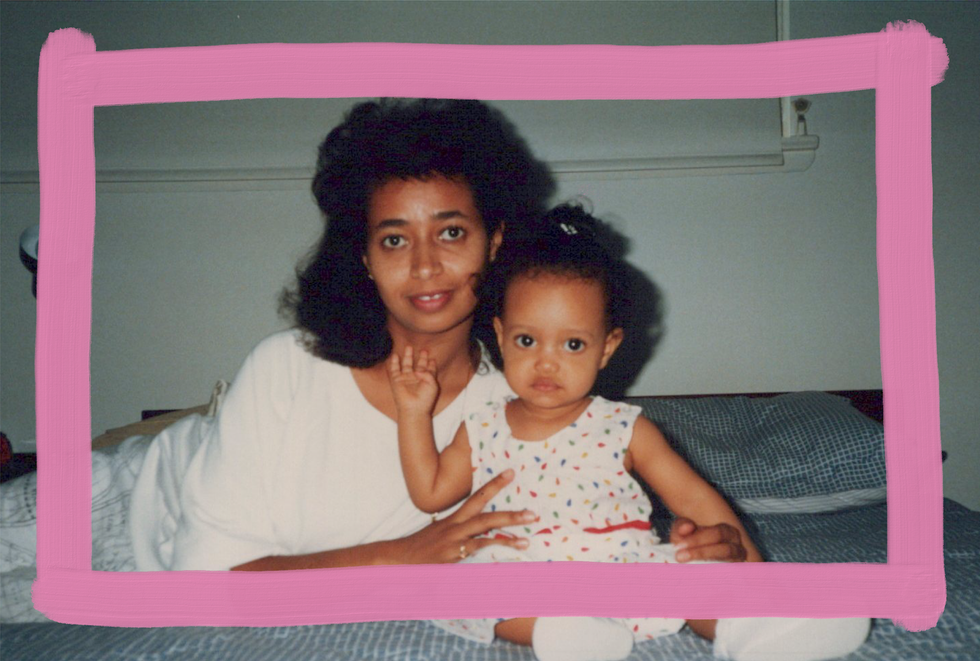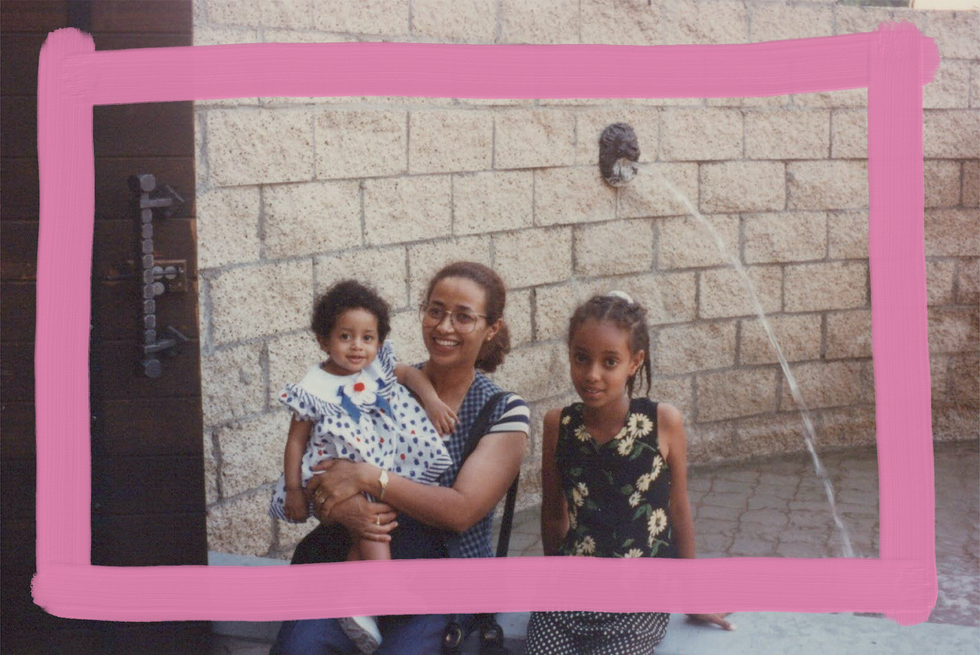
The other day, as I was organizing my home office, I stumbled on a tiny spiral notebook small enough to fit in my pocket. I grazed my fingers across the cover knowingly, wiping off the dust and preparing myself to peruse the pages.
I hadn't opened this booklet in over a decade. The pages I had happened upon were peppered with bulleted, treasured memories of my late mother.

It was like stumbling on a forgotten time capsule. For context, in the aftermath of my mom's passing to Triple Negative Breast Cancer, I authored an extensive piece for a Creative Nonfiction workshop in an effort to commemorate her life. This collection of abbreviated vignettes, notes, and ideas was the crux of that memorial essay.
As I went through my notes and then in revisiting my draft(s), I realized how fundamental that workshop was in allowing me to reconcile with my grief. Through that process, I learned that channeling your creativity is a powerful antidote for pain.
I remember volunteering to write the first piece for workshopping, which I entitled Confessions of a Reformed Anti-Pinkist. My introduction of the essay immediately launched into an after-school special-esque beginning (which was also an ending):
"I detest olives—almost (but not quite) as much as the smell of cigarette smoke. And Tuesdays—I cannot stand Tuesdays. But nothing, absolutely nothing, can compare to the complete and utter hatred I had for the color pink in 2008—a passionate distaste that could not even be surpassed by pubescent, cootie-fearing boys that denounced the color in order to reaffirm their budding manhood. So, you can only imagine the irony as I smiled to myself when I updated my Blackberry Messenger status on January 7th, 2010 to say one solitary word: pink.
That—my friends—that is what they call growth.
It is growth because I realized over a year and some change that letting someone go does not mean forgetting them. Growth, because, I realized having a memory of something is better than not ever having had it at all. So, while I had developed an extreme distaste for the color because it reminded me of what is no more, I came to realize that it is also a testament of what was once great—or, much rather what still is. So, in my participation of the pseudo-virtual activism that was the rave of social media websites on January 7th, 2010, it was only fitting that on the day that women across the globe took to their Facebooks, Twitters, and other profiles to update their statuses with the colors of the bras they were wearing in the name of Breast Cancer Awareness, that mine would be pink.
I, and thousands (if not millions) of women “flashed” the world with no explanation—this simple, viral color update trend raised curiosity about the cause. And with tweet after tweet, status after status, and an upsurge of Google inquiries that resulted in a huge spike in communications on the unfortunate disease, dialogue on the topic was at an all-time high. A Susan G. Komen for the Cure spokesman was quoted as saying, “It is fun. It gets people talking, and hopefully, it will lead folks to really getting a greater awareness of something that’s going to affect one in eight American women.”
One of which was my mother, more affectionately known as mommy, or if I really wanted something, Laly (a nickname I coined for her as a toddler). But now she, Rahel, is called my angel…literally and figuratively."
While my instructor and classmates championed me for sharing my sad but optimistic story, the most resonating theme in the critiques was that it didn’t feel fully realized, or fully “real” for that matter. I skirted over the details and depth of pain in exchange for a shallow focus on the silver lining.
"You didn't allow me to get to know her well enough," one workshop-mate called out. "I want to be more invested in her, so when the loss happens, I could feel it personally."
I guess in my yearning to find a happily ever after, there was also a desire to quickly pull the bandage off and not spend too much time dwelling on the sadness. But now I realize dwelling is exactly what you are supposed to do. It is okay—necessary even—to take your time processing the loss of something great.

So I reworked the essay. And I reworked the essay. And I reworked it some more. The idea was to strip away all of the sugarcoated, positive thinking that I had attempted with the first version and instead delve into a real account of pain, love, and redemption.
I began my second effort, A Happy Ending Depends On Where You Stop Your Story, from a position of honesty—based on raw emotion, not knowing what would come out but refusing to censor the range of emotions I was experiencing. And I invited loved ones to join me in the process, collecting eulogies to aid in painting a fuller portrait of my mother, further characterizing her through not only my eyes but also through the eyes of others.
The response to my second draft was much more visceral. The individual that had initially called out wanting to feel more connected to my mom as a character called my revision a terribly beautiful read, crying as she described the impact of my edit.
Once it was done I realized how cathartic writing this way was. It was this second version of the essay that really made me realize just how much I had grown since losing my mother.
After submitting it for my final piece, I took a step back and realized that its existence meant so much more than what was on paper. And how I dealt with the tragedy through writing only brought me to learn how important it is to take ownership over your grief and grow with it versus ignoring or denying it.
And in this way, my story did end happily. Sure, it was a different type of happy ending than I originally intended. But it is not a fairy tale ending—it is mine. It's real. And that’s all I ever wanted.

Following the writing of my essay, I continued to use a variety of mediums to creatively combat the rare and aggressive disease that took my mother's life. I wanted to bring her spirit of creativity by partnering with artists. I wanted to share her sense of empathy and understanding by being an ear for patients and their loved ones. I wanted to embody her commitment to togetherness and teamwork by producing events she would enjoy. And I did.
I launched user-generated social campaigns to spread awareness, produced giveback products and lines with corporate sponsors like Bloomingdale's and TOMS, put the "fun" in fundraising, and served on the Board of Trustees of the Triple Negative Breast Cancer Foundation.
If you're looking to confront grief through creativity, keep these tips in mind:
1. Give yourself time and space to process your emotions. Don't rush the grieving process, as this can impede your ability to cope effectively.
2. Try engaging in creative activities that allow you to explore your feelings and experiences. Writing, painting, or making music can be great ways to channel your grief in a constructive way.
3. Connect with others who are also grappling with grief and loss. Sharing stories and experiences can help you find solidarity and support during this difficult time.
4. Remember that healing is an ongoing process that may take time. Cultivate self-compassion and acceptance as you work through your grief, rather than beating yourself up for feeling sad or frustrated. With time, you will begin to heal and find meaning in your loss.
In the end, confronting grief through creativity can be an incredibly powerful and transformative experience. By harnessing your emotions in a constructive way, you can come out of this difficult time stronger than ever before. The most important thing is to honor your own process and listen to what you need at any given moment. There is no right or wrong way to grieve—only what feels right for you.
To support the fight against Triple Negative Breast Cancer, consider donating to the Triple Negative Breast Cancer Foundation. For more content on grief and creativity, subscribe to Permission To Be Human for my reflections on big moods, feelings, and humanity. And if you have a personal experience you'd like to share, DM me or email me at sophie@brit.co.
0 Commentaires